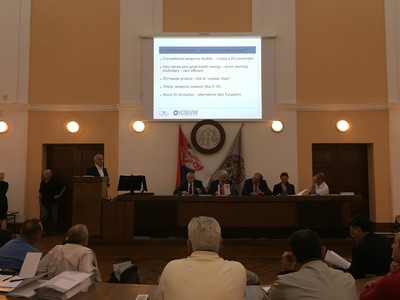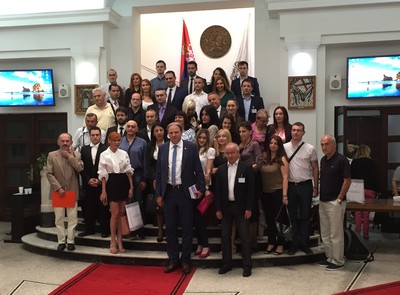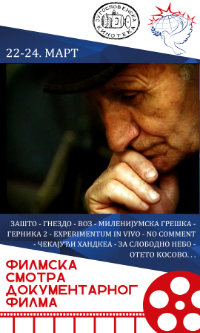The First International Symposium 'Consequences of the bombing of the FR of Yugoslavia with depleted uranium in 1999', Nis/Serbia, June 17-19, 2018
| Activities - Comments |
The symposium gathered experts from Serbia, Russia, Germany, Switzerland, Cyprus and Italy to discuss possible humanitarian actions to help victims of depleted uranium (DU) bombings and the option of legal proceedings.
11 July 2018 - ICBUW
The event was very successful and was covered by Russian, Serbian and even Chinese journalists, receiving wide media coverage in Serbia. For three days, domestic and international participants had the chance to connect with each other as well as to present and discuss their work. ICBUW was represented by Professor Manfred Mohr, whose expertise was highly appreciated by Serbian colleagues. As ICBUW has been concerned with the use of DU in the Balkans throughout the years, the conference offered an opportunity to share insights into the often neglected topic.
Background
 During the war in the former FR Yugoslavia, uranium ammunition was used in 1999 during the NATO operation “Allied Forces”, in particular by US A-10 combat aircrafts. According to research and data published by the NATO, 10-15 tons of toxic and radioactive material was shot at various targets in today's Serbia, Kosovo, Montenegro and Bosnia-Herzegovina. The mostly industrial targets were often located in populated areas and bombings therefore contaminated the habitat of many people.
During the war in the former FR Yugoslavia, uranium ammunition was used in 1999 during the NATO operation “Allied Forces”, in particular by US A-10 combat aircrafts. According to research and data published by the NATO, 10-15 tons of toxic and radioactive material was shot at various targets in today's Serbia, Kosovo, Montenegro and Bosnia-Herzegovina. The mostly industrial targets were often located in populated areas and bombings therefore contaminated the habitat of many people.
Even though decontamination projects were introduced to reduce the risk to civilians and the environment, according to Serbian doctors, the population is still struggling with long-term health effects. While complete decontamination is almost impossible, worryingly, the information about the bombarded targets was published too late and partly incorrect. UNEP (United Nations Development Program) published three reports after the conflict, including concrete recommendations for decontamination. However, as part of an on-site investigation in 2011, ICBUW found that the recommendations had not been implemented in full and observed severe shortcomings regarding long-term monitoring (ICBUW, "A Question of Responsibility").
Many people in the affected regions of former Yugoslavia therefore came in contact with the toxic substance, probably continue to carry it in their bodies and may even pass on the burden to the next generation as a higher rate of birth defects has been observed. Contaminated land or groundwater could still contaminate people with depleted uranium residues.
In Serbia, significantly fewer places were contaminated with DU than, for example, in Kosovo and more extensive decontamination work has been executed. Nevertheless, even today, almost 20 years later, physicians still attribute increased cancer rates and other diseases to DU. There is still little information about the situation of civilians in Kosovo, where many people have fled from contaminated regions while in particular the poorest families have to stay. ICBUW and former member of the European Parliament Els de Groen proposed a project to collect data on the health effects in Kosovo communities in 2017, the project proposal still being under discussion.
Reactions and Italian cases
Different reactions to the NATO operation early on were somewhat disappointing. After the bombing in 1999 the media took on the topic of DU and the NATO reacted by installing an Ad Hoc Committee on DU, which concluded that “there is no scientific link established between DU and health complaints”. Also, the International Criminal Tribunal for the former Yugoslavia did not commence further investigation into the use of DU, in line with the Final Report to the Prosecutor. Furthermore, Yugoslavia filed a first application to the International Court of Justice (ICJ) instituting proceeding against ten involved NATO members on the legality of use of force, but the Court rejected the case.
The picture changed with judgements of Italian courts in various cases on the causality of DU and different types of cancer. During the limited clearance activities in Kosovo Italian recruits were involved and a great number of them suffered from illnesses later that could be traced back to DU. Many of them have gone to court and so far twenty cases have been awarded compensation. It is not only the population therefore but also deployed soldiers who suffer from the use of DU (described as Balkan, or Gulf-war syndromes).
The aim of the conference
Prof. Dr. Srdan Aleksic, the main organizer of the symposium, built up a reputation as a lawyer in Serbia, mainly dealing with social rights cases. He sees the DU bombings as clear violation of international conventions because civilians and the environment suffered long term harm and for that reason he is dedicated to helping the victims, many of whom he knows personally, and fight for their medical care – as a last resort by legal means. While newspapers already reported that Serbia would sue NATO after nearly 20 years to claim compensation for the affected civilians and polluted environment, this undertaking is rather complicated.
As Dr. Aleksic and his colleagues are aware that this project is not quite that simple, they are not primarily concerned with a lawsuit, but with providing assistance for civilian victims and the stigmatisation of uranium weapons per se. Together with the present international colleagues and experts, possible steps were discussed during the conference – legal possibilities on the one hand and the necessary humanitarian action on the other hand.
During a full day of lectures given by the Serbian and international experts at the University of Nis, work on the consequences of the bombing from different fields has been presented by soldiers, lawyers, physicians and activists. This was accompanied by detailed, and often depressing descriptions of the damage occurred, including statistical data and voices of victims. Within the scope of this wide-ranging examination, first proposals for steps and proceedings found their way into the discussion, also extending to the political field (like a special DU committee and linked centres to be set up in Serbia).
Professor Manfred Mohr, spokesman of ICBUW, was able to present the framework as well as suggestions with his lecture on uranium weapons and the legal and political perspective on them. During the next day’s meeting, possible (legal) steps were discussed in detail.
 If Serbian lawyers tried to open legal proceedings, it is questionable which court would take on the matter. National courts (in NATO countries) would most likely disclaim jurisdiction with the argument of the international, or inter-State, character of the case brought up by individual victims. As to the international scale, there is the idea of an ad-hoc tribunal while it seems not very realistic to go back to the ICJ again. Maybe one should look into the potential of human rights mechanisms (apart from judicial proceedings; e.g. in the setting of the UN Human Rights Council). Anyway, the conference allowed for a diverse discussion and elaborated on helpful advice. As the ground work is done, the Serbian project team now has to examine their options. ICBUW stands ready to further give input and to closely cooperate, i.a. by commonly drafting a “strategy paper”.
If Serbian lawyers tried to open legal proceedings, it is questionable which court would take on the matter. National courts (in NATO countries) would most likely disclaim jurisdiction with the argument of the international, or inter-State, character of the case brought up by individual victims. As to the international scale, there is the idea of an ad-hoc tribunal while it seems not very realistic to go back to the ICJ again. Maybe one should look into the potential of human rights mechanisms (apart from judicial proceedings; e.g. in the setting of the UN Human Rights Council). Anyway, the conference allowed for a diverse discussion and elaborated on helpful advice. As the ground work is done, the Serbian project team now has to examine their options. ICBUW stands ready to further give input and to closely cooperate, i.a. by commonly drafting a “strategy paper”.
Conclusion
The trauma of the NATO bombing is still deep in Serbia and there has been almost no process of coming to terms with the past. Even today, many Serbs do not want to talk about the NATO bombing, reports Dr. Aleksic. This international conference constitutes an important step in these regards. The long-term effects of DU, even after decades, and the recent use of DU ammunition three years ago in Syria clearly show that there is need for further discussion and action regarding uranium weapons, especially in relation to coping with the consequences and helping the victims.
| < Prev | Next > |
|---|
| Overstatement from Davos 2017. |
Liberal corporative capitalism, for reasons of lowering traveling costs, proposed not to travel to history alone but packed togather with NATO, EU and unipollar World Order. Workers participation has good chances to step in provisionally, buying time for full scale workers selfmanagment. |









